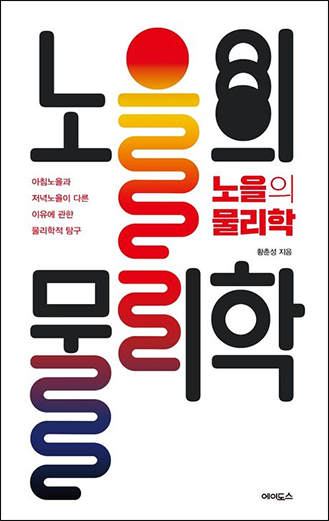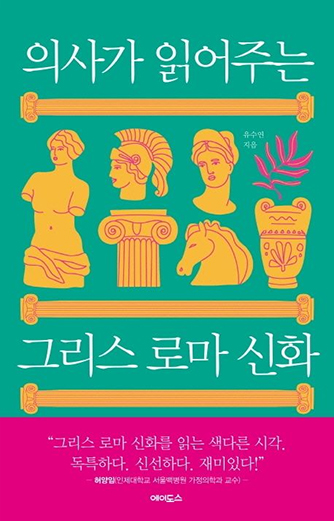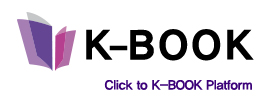|
Korean Publishers
Eidos Publishing House Contemplate Deeper, Imagine More Freely
2023.11.06
The word eidos is a concept in philosophy that refers to external appearance and shape. It is a perfect name for a publisher that ponders deeply on social phenomena and produces beautiful books that capture their very essence as books. Eidos, a one-man publishing company specializing in liberal arts and popular science books, makes books with a unique but special concept to bring science closer to readers. Despite the public’s growing interest in science, it still accounts for a small percentage of the market. However, Eidos believes that everything close to our lives can be the subject of a book - so there is no end to the list of titles to be published. Following is an interview with CEO Park Ray-Seon, who explains that the company’s goal is to continue to publish good books for readers who support them.
Logo of Eidos

It’s a pleasure to have you with us on K-Book Trends. Please introduce Eidos to our international readers, including the meaning of the company’s name.
I get asked a lot about the company’s name, but I often struggle to explain what it means – sometimes, I wonder if I have chosen the wrong name. In fact, the name, Eidos, is a bit pedantic, which means it is hard to explain in a simple way. I will just say that the name came from Plato’s The Republic, and is the archetype of “Idea.” The company started in 2011, and we mainly publish liberal arts and popular science books. I named the company Eidos out of the hope of making books that can help people contemplate deeply and imagine freely, while better embodying their nature as books, in a modern society where books are losing ground, but I’m not sure if I’m doing a good job of practicing what I meant.

Was there a particular reason for choosing to specialize in liberal arts and popular science books?
In the beginning, I didn’t necessarily think of publishing only liberal arts and popular science books. I was also interested in other fields, such as humanities. However, as I worked as an editor of liberal arts and popular science books for a long time, I naturally ended up publishing a lot of science books. In particular, I often met scientists in the course of my work as an editor, and I was drawn to their open-mindedness and free, youthful thinking.

“Beautiful science books, strong humanities books, and books for anyone who cares about life” is an impressive introduction. What do you mean by “beautiful science books,” and what do you focus on to make them beautiful?
During the time when I was reading liberal arts and popular science books, the fields that were being published were very limited. They were heavily centered on physics and biology, and the topics were not segmented. How should I put it? It was kind of like a big lump. It would be a bit of an exaggeration to say, “There’s nothing left to read when you finish reading a few science books,” but that is what it really felt like. In particular, regarding their designs, they were way behind the curve, to be honest. That is why I thought that I should publish books that were a little bit more pretty, while covering topics that were a little bit more microscopic. When we talk about “beautifulness,” we actually refer to design. So, when I first started publishing books, I paid a lot of attention to design, while trying to choose topics that were a little bit more unique, a little bit more microscopic. Nowadays, there are quite a few publishers who publish books like this.
We want to make books that better embody their nature as books.

Recently, the “popularization of science” has become a trend in Korea. It is probably thanks to the active participation of renowned scientists in broadcasts, lectures, and publications. Do you feel readers’ heightened interest in science, compared to the past?
The public’s increased interest in science has been truly palpable. In recent years, in particular, the extraordinary interest in science books has been the talk of the town. It is a good thing that readers are more interested in science. But the interesting thing is that the population of science book readers hasn’t actually grown that much. Science still makes up a small percentage of the market compared to other fields. When you look at the data, liberal arts and popular science account for maybe 2 to 3 percent of the total, and I don’t think that’s necessarily a good thing from a publisher’s perspective. Science books used to be kind of a blue ocean in the publishing market, but now it seems like it has become a red ocean. Also, when I started the company, publishing science books was quite attractive because there weren’t a lot of science book editors. It was good for a small publisher to start with a unique concept and survive, but now that is not the case. I hope that the market pie for science books and science book readers grows bigger in proportion to the public’s interest.

Eidos is known for being a one-man publishing company. One-man publishing gives you a lot of editorial freedom, but it can also be challenging because you have to do all the editing, marketing, production, and management yourself. What are the advantages and disadvantages of one-man publishing?
Most people in the one-man publishing business dream of having coworkers in a fancy office. It is probably because what we do is a bit lonely: we are free, but lonely; we are more spontaneous than any organization, but things progress a bit slower; we can do things with our books that we can’t do with a team, but there is a fair chance we will fail; we don’t sell as many books as a big company, but we are less affected when market conditions are tough; we don’t get stressed and overwhelmed by teammates, but we do get dragged down with stalled development.
We will get closer to our readers

Your publications cover a broad range of subjects, from medicine, plants, and sleep to psychology. It seems like you must have a wide range of interests and perspectives on different topics in the world. What are some of the things you focus on to keep Eidos competitive?
It is a difficult question. It is also a big challenge for us to tackle in the future. As I said, there are a lot of large, competitive publishers in the science book market now. There are more small publishers making science books. It is not easy to find our own competitive edge in this situation. Choosing from so many new books is also a little stressful for readers. The increase in the number of titles is not a good thing for a publisher like us, considering that the reader population is not growing much. I think we need to reach out to readers with more unique and differentiated topics, concepts, and designs. It is always a challenge to decide what kind of book to make and what type of concept to develop. I think that is one of the reasons we publish books in multiple fields of science.

Books with titles like A Psychiatrist’s Table, Physics of Sunset, and Greek Mythology Read by a Doctor catch our attention because they connect seemingly unrelated keywords and provoke interest and curiosity. Do you have any tips for writing titles that draw readers in?
Personally, I think titling is a really hard thing to do. As an editor, you have both a lot of love and greed for a book. It is important to juggle and balance those two things, but sometimes, you fail to do that without even realizing it. If you are too greedy or too attached to a book, you might feel challenged when it comes to the production and promotion of the book.
A Psychiatrist’s Table, Psychis of Sunset, and Greek Mythology Read by a Doctor

What is Eidos’ unique way of discovering good authors or content? And what areas would you like to expand into in the future?
We use multiple channels to find good content and authors. We read things like blogs, Brunch posts, and Naver bands (a mobile community application that facilitates group communication), or follow writers on their social media accounts and ask them to write a book for us if their postings match what we are looking for. We mainly try to find new writers. They might have weaknesses in publicizing their work, but their passion as new authors is extraordinary, which makes it fun to work with them.

You recently translated and published David George Haskell’s Sounds Wild and Broken, which was shortlisted for the Pulitzer Prize for General Nonfiction in 2023. In addition to this book, you also play a role in promoting good foreign books to Korean readers. Do you have any books by Korean authors that you would like to introduce to international readers?
One is The Six Faces of the Mind, written by a psychiatrist. This book explores our minds through six topics: depression, anxiety, anger, addiction, insanity, and love. The psychiatris’s personal stories, counseling experiences, and theoretical insights into the mind are mixed together. The second is The Power of Sleep. The writer, who has been studying sleep medicine for a long time, explains the importance of sleep in a very lucid way, presenting literature, the history of sleep medicine, and clinical cases with convincing research results. This book is a must-have for anyone living in the modern world where sleep is becoming increasingly important.
The Six Faces of the Mind and The Power of Sleep

We look forward to Eidos publishing beautiful books with sparkly topics and robust editing. Can you tell us about any future plans or goals?
We don’t really have any specific plans or goals for the future - we just want to keep publishing books in fields we love, by writers we love, and for readers who love our books. And that is, to survive and do what we love.
#Eidos#Popular science books#One-man publishing#Pulitzer Prize#Science |
Pre Megazine
-

Jakkajungsin Publishing Co.
VOL.69
2024.04 -

Writer Yun Jung-Eun
VOL.69
2024.04 -

Jumping Books Publishing House
VOL.68
2024.03 -

Writer Kim Hwa-Jin
VOL.68
2024.03 -

Publisher Hyohyung
VOL.67
2024.02 -

Writer Minha
VOL.67
2024.02 -

Almond Publishing
VOL.66
2024.01 -

Writer Kwon Jung-Min
VOL.66
2024.01 -

Hakgojae Publishers
VOL.65
2023.12 -

Writer Kim Hye-Jung
VOL.65
2023.12 -

Eidos Publishing House
VOL.64
2023.11 -

Writer Hwang In-Chan
VOL.64
2023.11 -

Munhakdongne
VOL.63
2023.10 -

Writer Chang Kang-myoung
VOL.63
2023.10 -

Happywell Publishing
VOL.62
2023.09 -

Writer Baik Soulinne
VOL.62
2023.09 -

Dasan Contents Group (Dasan Books)
VOL.61
2023.08 -

Writer Lim Kyoung-Sun
VOL.61
2023.08 -

SpringSunshine Publishing Co.
VOL.60
2023.07 -

Writer Lee Kyung-Hye
VOL.60
2023.07 -

Human Cube
VOL.59
2023.06 -

Doctor Jeong Jae-Seung
VOL.59
2023.06 -

Anonbooks
VOL.58
2023.05 -

Writer Son Bo-Mi
VOL.58
2023.05 -

Namhaebomnal
VOL.57
2023.04 -

Writer Kim Bo-Young
VOL.57
2023.04 -

Hugo Publishing
VOL.56
2023.03 -

Writer Cho Kwang-Hee
VOL.56
2023.03 -

Balgeunmirae Publishing Co.
VOL.55
2023.02 -

Writer Lee Byung-Ryul
VOL.55
2023.02 -

Wisdom House, Inc
VOL.54
2023.01 -

Writer Jeong Jia
VOL.54
2023.01 -

Humanitas
VOL.53
2022.12 -

Writer Kim Yeon-Su
VOL.53
2022.12 -

Songsongbooks
VOL.52
2022.11 -

Writer Eun Hee-Kyung
VOL.52
2022.11 -

Bombom Publishing Co.
VOL.51
2022.10 -

Writer Jiwon Yu
VOL.51
2022.10 -

Hangilsa Publishing Co., Ltd.
VOL.50
2022.09 -

Writer Kim Won-Young
VOL.50
2022.09 -

Moksu Publishing Company
VOL.49
2022.08 -

Writer Yoo Sun-Kyong
VOL.49
2022.08 -

Next Wave
VOL.48
2022.07 -

Writer Park Sang-Young
VOL.48
2022.07 -

A Thousand Hopes
VOL.47
2022.06 -

Writer Bora Chung
VOL.47
2022.06 -

Woongjin ThinkBig
VOL.46
2022.05 -

Dr. Oh Eun-Young
VOL.46
2022.05 -

JECHEOLSO Publishing House
VOL.45
2022.04 -

Writer Jang Ryu-Jin
VOL.45
2022.04 -

Changbi Publishers
VOL.44
2022.03 -

Writer Kim Ho-Yeon
VOL.44
2022.03 -

Mati Books
VOL.43
2022.02 -

Writer Lee Kkoch-Nim
VOL.43
2022.02 -

Picturebook Gongjackso
VOL.42
2022.01 -

Writer Kim Sang-Wook
VOL.42
2022.01 -

Writer So-yeon Park
VOL.42
2022.01 -

Writer Yoo Eun sil
VOL.42
2022.01 -

Kungree Press
VOL.41
2021.12 -

Writer Kim Lily
VOL.41
2021.12 -

Writer Park Yeon-jun
VOL.41
2021.12 -

Writer Yi Hyeon
VOL.41
2021.12 -

A deeper world told through picture books 'Iyagikot Publishing (Story Flower)'
VOL.12
2019.06 -

Author Jeon Min-hee
VOL.12
2019.06 -

Illustrator Kim Hwan-Young
VOL.13
2019.07 -

Travelers sailing through the sea of knowledge - 'Across Publishing Group Inc.'
VOL.13
2019.07 -

Genre Novel Publisher 'Arzak Livres'
VOL.14
2019.08 -

Author Lee Yong-han
VOL.14
2019.08 -

Wookwan Sunim
VOL.15
2019.09 -

East-Asia Publishing
VOL.15
2019.09 -

Author Jo Jung-rae
VOL.16
2019.10 -

EunHaeng NaMu Publishing
VOL.16
2019.10 -

Writer Heo Kyo bum
VOL.40
2021.11 -

Writer Kim So-Young
VOL.40
2021.11 -

Author-illustrator Kim Sang Keun
VOL.40
2021.11 -

ACHIMDAL BOOKS
VOL.40
2021.11 -

Author Kang Gyeong-su
VOL.17
2019.11 -

Moonji Publishing Belongs to the Literary Community
VOL.17
2019.11 -

Author Kim Yun-jeong
VOL.18
2019.12 -

I-Seum
VOL.18
2019.12 -

Kim Cho-Yeop
VOL.19
2020.02 -

Creating a window into the future with books
VOL.19
2020.02 -

Author Serang Chung
VOL.20
2020.03 -

Hey Uhm
VOL.20
2020.03 -

Writer Lim Hong-Tek
VOL.21
2020.04 -

BIR
VOL.21
2020.04 -

Writer Song Mikyoung
VOL.39
2021.10 -

Author-illustrator Kim Dong Su
VOL.39
2021.10 -

Writer Lee Seula
VOL.39
2021.10 -

Tabi Books
VOL.39
2021.10 -

Writer Kim Soo-hyun
VOL.38
2021.09 -

Author-illustrator Lee Myoung Ae
VOL.38
2021.09 -

Writer Hwang Sunmi
VOL.38
2021.09 -

Kidari Publishing Co.
VOL.38
2021.09 -

Writer Sohn Won-Pyung
VOL.22
2020.05 -

Woods of Mind's Books
VOL.22
2020.05 -

Writer Heungeul
VOL.23
2020.06 -

Gloyeon
VOL.23
2020.06 -

Maumsanchaek
VOL.24
2020.07 -

Winners of the 2021 Bologna Ragazzi Award
VOL.37
2021.08 -

Picture book artist Lee Suzy
VOL.37
2021.08 -

Author-illustrator Yi Gee Eun
VOL.37
2021.08 -

Hubble
VOL.37
2021.08 -

Writer Baek Se-Hee
VOL.25
2020.08 -

Bearbooks Inc.
VOL.25
2020.08 -

Author Baek Hee-Na
VOL.26
2020.09 -

Yuksabipyoungsa
VOL.26
2020.09 -

Writer Kang Hwa-Gil
VOL.27
2020.10 -

Kinderland (Bandal)
VOL.27
2020.10 -

Writer Ha wann
VOL.36
2021.07 -

Author-illustrator Myung Soojung
VOL.36
2021.07 -

Writer Jung Yeo-Wool
VOL.36
2021.07 -

Publisher EcoLivres
VOL.36
2021.07 -

Writer Lee Geumi
VOL.28
2020.11 -

Sakyejul
VOL.28
2020.11 -

Writer Kim Keum-Hee
VOL.29
2020.12 -

Geulhangari
VOL.29
2020.12 -

Writer Cheon Seon-Ran
VOL.30
2021.01 -

Hyang Publishing House
VOL.30
2021.01 -

Writer Lee Hee-Young
VOL.31
2021.02 -

Sanzini
VOL.31
2021.02 -

Publisher Prunsoop
VOL.32
2021.03 -

Writer Sim Yun-Kyung
VOL.32
2021.03 -

Hanbit Media
VOL.35
2021.06 -

Hyeonamsa
VOL.33
2021.04 -

Author-illustrator Noh Inkyung
VOL.33
2021.04 -

Writer Cho Won-Jae
VOL.35
2021.06 -

Writer Kim Jung-Mi
VOL.34
2021.05 -

Safehouse Inc.
VOL.34
2021.05















